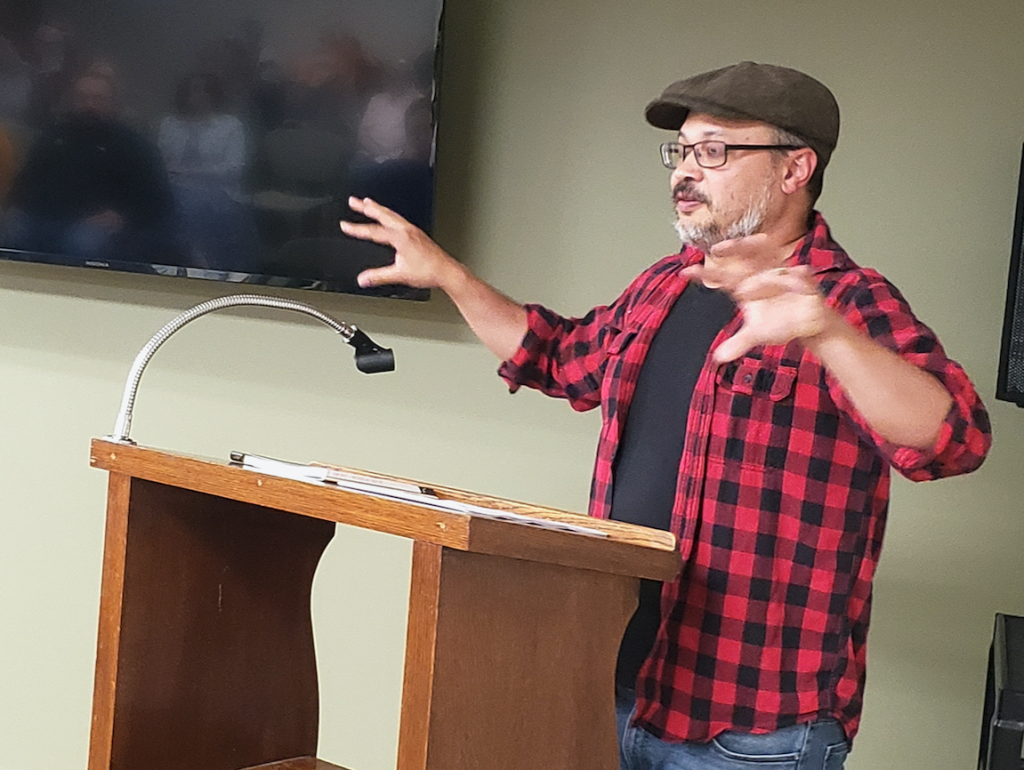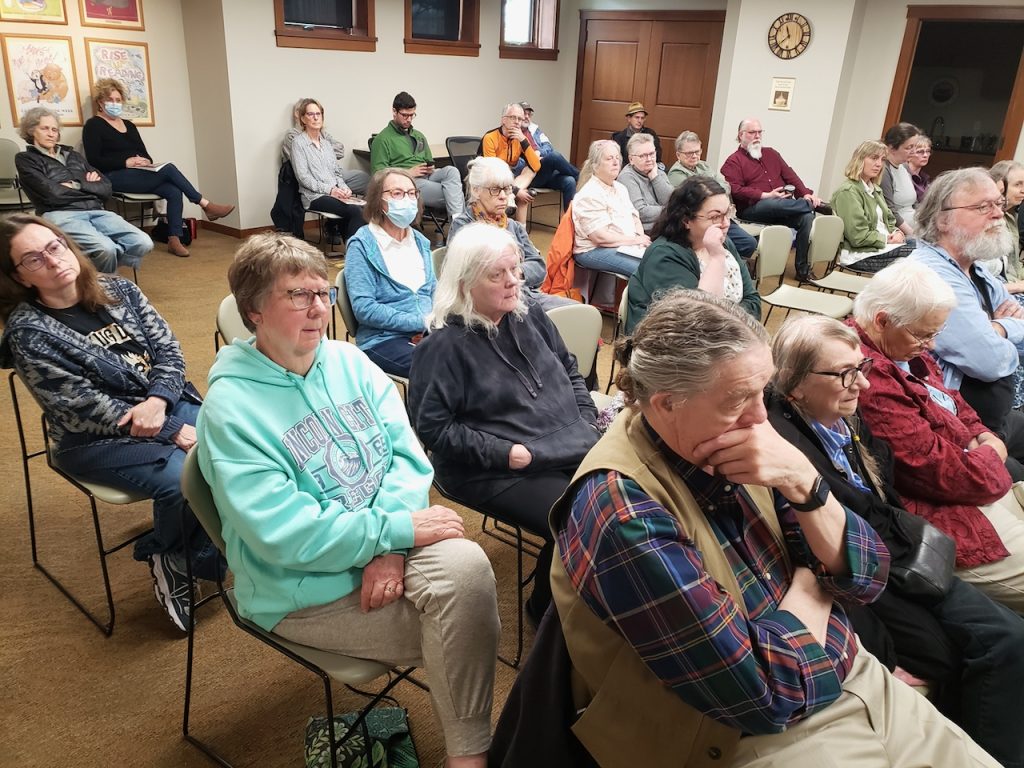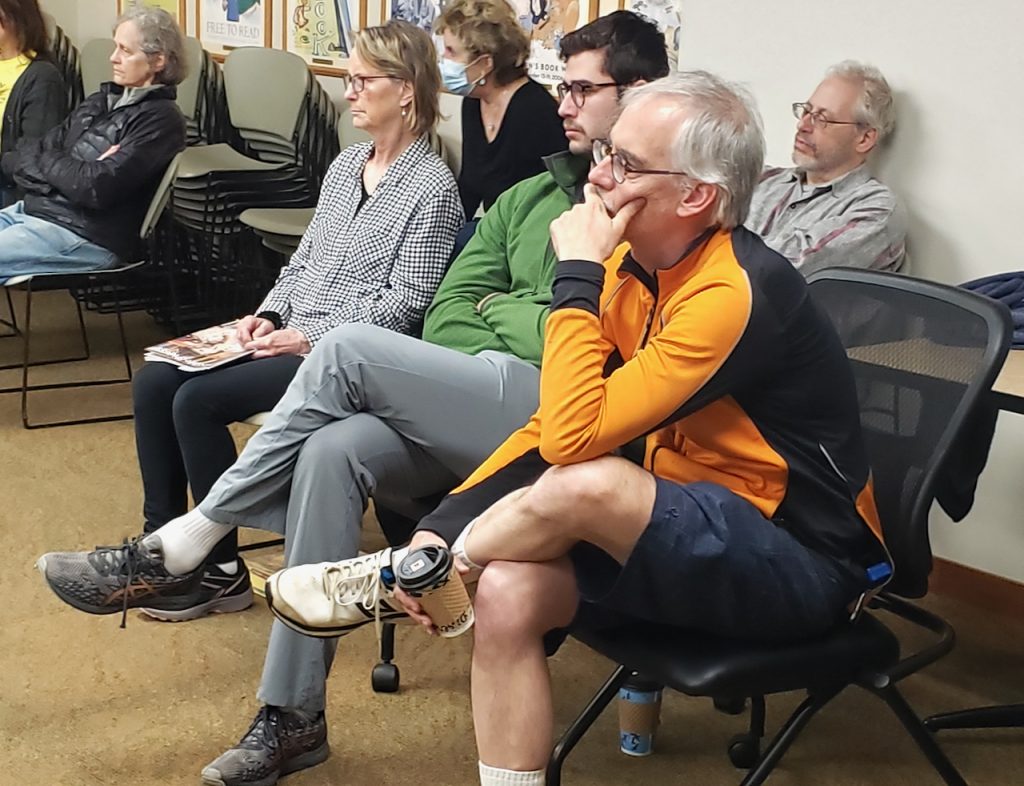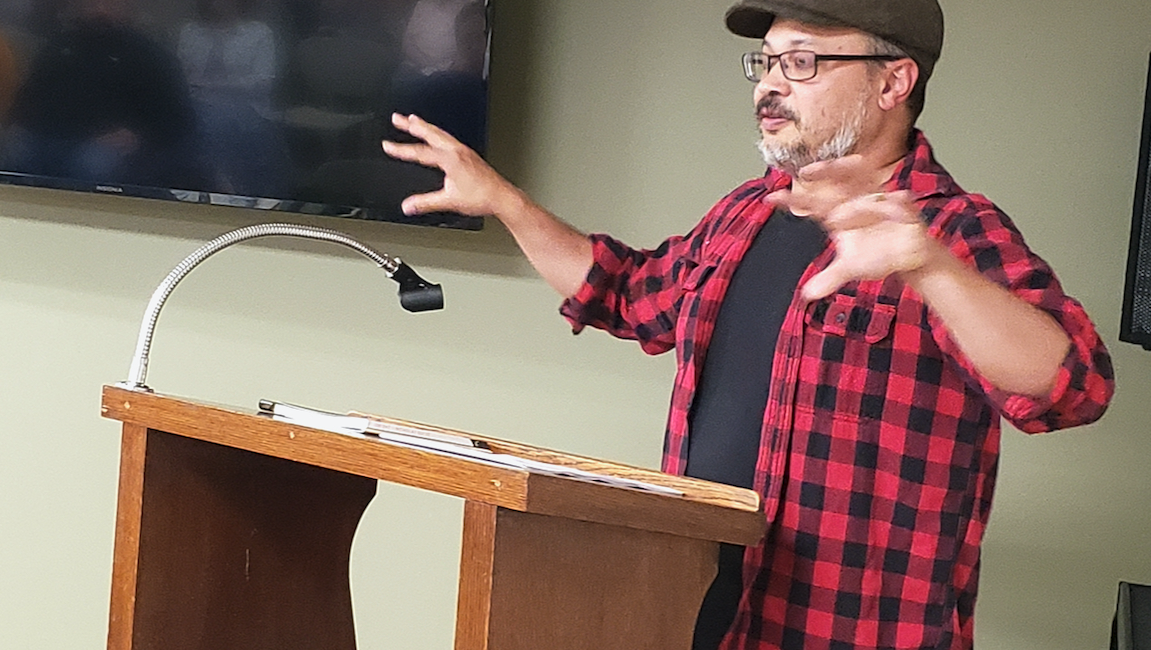By Chris Spangler
Fort Atkinson celebrated the 120th anniversary of the birth of Lorine Niedecker on Saturday with several special activities.
The late Fort Atkinson poet, who grew up on Blackhawk Island, was saluted at events hosted by the Hoard Historical Museum and Friends of Lorine Niedecker.
Activities included a morning bicycle tour featuring locations significant to Niedecker’s life and work; a discussion led by Lauren Carlson, a Niedecker Fellowship winner; a temporary exhibition featuring the written works of female authors who also are residents of Fort Atkinson, and a presentation by 2023-24 Wisconsin Poet Laureate Nick Gulig.
A Fort Atkinson resident, Gulig addressed 42 guests during an 11 a.m. talk at the Dwight Foster Public Library.
An associate professor at the University of Wisconsin-Whitewater, the Thai-American poet will serve as poet laureate for the state through the end of 2024.
According to information released by the Wisconsin Poet Laureate Commission (WPLC) in January, Gulig studied literature at the University of Montana, the University of Iowa Writer’s Workshop, and the University of Denver.
In 2011, he received a Fulbright Fellowship to Bangkok, Thailand, during which he completed his first book “North of Order.” Cutbank Books published his second collection, “Book of Lake.” In 2018, his third collection, “Orient,” was a finalist or semi-finalist in six national book contests, eventually winning the coveted CSU (Colorado State University) Open Book Poetry Prize.
Locally, he has twice won the “Wisconsin People and Ideas” poetry award: once in 2017 for a poem titled: “The New American Nostalgia,” and this year for a poem titled: “Of Genesis.” Gulig has given talks and readings across the state, including for the Chippewa Valley Writer’s Guild where he spoke alongside former Wisconsin Poet Laurette Max Garland.
At the University of Wisconsin-Whitewater he works with young Midwestern writers daily in the classroom.
In addition, Gulig guides the “UWW Creative Writing Festival,” an event that brings more than 600 students annually to the UW-Whitewater campus to take workshops with other students from around the state, and the “Growing Writers Summer Camp,” which focuses on providing middle and high school students access to college-level writing instruction and community, according to the release.
He also founded and curates a variety of reading series, including “The Warhawk Reading and Lecture Series,” “The Lamplight Reading Series,” and the “Faculty Spotlight Reading Series.”
Gulig received a Faculty Initiative for Research Excellence (FIRE) grant to study the poetry of Lorine Niedecker, conducting research on and recreating Niedecker’s 1966 trip circumnavigating Lake Superior, the release read.
Niedecker’s background
According to information made available through the Hoard Historical Museum and the Friends of Lorine Niedecker group, the poet was born in Fort Atkinson on May 12, 1903, to Henry and Theresa “Daisy” Kunz Neidecker, Lorine Niedecker (she altered the spelling) wrote frequently about her father, a carp fisherman and tavernkeeper, and mother, an obsessive homemaker whose deafness turned her inward and pushed her husband to a neighbor who comforted him until his money ran out.
Niedecker graduated from Fort Atkinson High School in 1922 and attended Beloit College the following year. She began to publish her poetry in the mid-1930s, but never was far from routine occupations.
After two years as a library assistant at the Dwight Foster Public Library and scriptwriter at radio station WHA in Madison, she worked as a proofreader for Hoard’s Dairyman magazine from 1944-50 and then scrubbed floors at Fort Atkinson Memorial Hospital from 1957-63, just to “make a little money for the really important things,” she once said.
She lived alone in the Blackhawk Island cabin inherited from her father until her marriage in 1928 to farmer Frank Hartwig. They separated two years later, but didn’t divorce until 1942.
In 1962, Niedecker married Albert Millen, an outdoorsman-turned-building painter. She’d met the one-handed Milwaukeean when he bought a weekend cottage from her on Blackhawk Island. They lived in Milwaukee until he retired to Lake Koshkonong four years later. She quit her hospital job and became a housewife. She learned to sew and Millen taught her how to cook.
They traveled frequently — she with a notepad on her lap for her constant “scribbling” — visiting his children and enjoying the wilds of Lake Superior, Door County and the western United States.
It was during her marriage to Millen that Niedecker doubled her lifetime output of poetry. In fact, she believed that some of her later works were among her best.
She worked closely with her early mentor, Louis Zukofsky, founder of the Objectivist Movement, and was concerned with two issues: capturing the simple rhythms of American speech and the complexity implicit in life’s simplicity.
Her life also was filled with correspondence with literary greats such as Cid Corman and Jonathan Williams. She began writing not only about nature and home, but of people she admired in history, scientific discoveries and the mysteries of the universe.
On Dec. 1, 1970, Niedecker suffered a stroke and then died on New Year’s Eve. Millen passed away in 1981 and is buried alongside Lorine in Union Cemetery. His gravestone reads, “Al Millen, husband of Lorine Niedecker.”
Five volumes of her poetry were published before her death, but it has been during the five decades afterward that Niedecker’s works continue to become even a greater international sensation every day.
A Wisconsin State Historical Society historical plaque is located at the site of her former Blackhawk Island home, and the Dwight Foster Public Library has a permanent collection of the Niedecker’s works in its Friends of Lorine Niedecker Room. Niedecker also is the focus of artwork decorating local schools.
The Wisconsin Poetry Festival is named in her honor, and Fort Atkinson has become a mecca for pilgrims worldwide hoping to gain more insight into her works by communing with the Rock River she so loved.

Wisconsin Poet Laureate Nick Gulig addresses an audience Saturday morning at the Dwight Foster Public Library.


Two photos above: A full house of 42 guests listen intently to Wisconsin Poet Laureate Nick Gulig as he reads his own works. Chris Spangler photo.
This post has already been read 1309 times!
